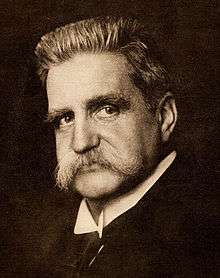Östen Undén
| Östen Undén | |
|---|---|
 | |
| Minister for Foreign Affairs | |
|
In office 31 July 1945 – 19 September 1962 (17 years, 50 days) | |
| Prime Minister |
Per Albin Hansson Tage Erlander |
| Preceded by | Christian Günther |
| Succeeded by | Torsten Nilsson |
|
In office 18 October 1924 – 7 June 1926 (1 year, 232 days) | |
| Prime Minister |
Hjalmar Branting Rickard Sandler |
| Preceded by | Erik Marks von Würtemberg |
| Succeeded by | Eliel Löfgren |
| Prime Minister of Sweden Acting | |
|
In office 6 October 1946 – 11 October 1946 (5 days) | |
| Monarch | Gustaf V |
| Preceded by | Per Albin Hansson |
| Succeeded by | Tage Erlander |
| Personal details | |
| Born |
25 August 1886 Karlstad, Sweden |
| Died |
14 January 1974 (aged 87) Bromma, Sweden |
| Political party | Social Democrats |
Bo Östen Undén (25 August 1886 – 14 January 1974) was a Swedish academic (J.D.), civil servant and Social Democratic politician, serving as acting Prime Minister of Sweden 6 – 11 October 1946, following the death of Per Albin Hansson.[1] In 1917, he was appointed professor and head of the department of civil law at Uppsala University, but he came to divide his career between politics and academia, which prompted his resignation from the position as rector magnificus (1929–1932) of that university. He served as the foreign ministry's expert on international law, as Minister for Foreign Affairs of Sweden 1924–1926 and 1945–1962, minister without portfolio 1917–1920 and 1932–1936, the government's chancellor for universities 1937–1951, and he chaired the parliament's committee on foreign relations during World War II.
Östen Undén was much respected, particularly within the Social Democratic Party, but was never uncontroversial. He belonged, together with Ernst Wigforss, clearly to the left-wing faction of the Social Democrats, and has in retrospect been criticised for a much too rosy view of the Soviet Union that remained for all of his time as Foreign Minister, ending in 1962.
At the same time, Undén must be acknowledged as a chief representative for Sweden's covert Cold War adaptation to the United States, as in his view Swedish governmental agencies, including the Defence Forces, were free to conclude any agreements with foreign powers and agencies that didn't literally contradict international treaties Sweden was a party of – as long as he and his ministry wasn't formally involved. As an effect, the Swedish government could even before the founding of NATO agree to build air bases in eastern Scandinavia suitable for bombing missions against Leningrad. Similar adaptations included integration in the US embargo policy from the Korean War and on, and an agreement signed with the Kennedy administration including some guarantees for US support in case of a Soviet attack.
In 1961, his proposal, "The Undén Plan", argues that states without nuclear weapons should declare that they refused to produce such weapons and to refuse to receive and store such weapons. Undén's proposal was accepted by the United Nations General Assembly as a UN resolution with 58 votes in favour (Scandinavia, Warsaw pact, third world countries), 10 votes against (NATO members) and 23 votes of abstention (Latin America, former French colonies in Africa).
Undén died on 14 January 1974, aged 87.
References
| Political offices | ||
|---|---|---|
| Preceded by Eliel Löfgren |
Minister for Justice 1920-1920 |
Succeeded by Assar Åkerman |
| Preceded by Erik Marks von Würtemberg |
Swedish Minister for Foreign Affairs 1924–1926 |
Succeeded by Eliel Löfgren |
| Preceded by Christian Günther |
Swedish Minister for Foreign Affairs 1945–1962 |
Succeeded by Torsten Nilsson |
| Preceded by Per Albin Hansson |
Acting Prime Minister of Sweden 1946-1946 |
Succeeded by Tage Erlander |
